Most seasons, the Oregon Shakespeare Festival (OSF) presents at least one play imported from another culture and adapted so it works for a contemporary American audience (e.g. The White Snake 2012, Throne of Blood 2010). This season, OSF gives its audience Secret Love In Peach Blossom Land by bilingual U.S. born Taiwanese playwright, Stan Lai. Secret Love In Peach Blossom Land is a cleverly and creatively structured stage play originally written in 1986 as a Chinese-language play, which is generally considered to be the most popular contemporary play in China – “an iconic play in contemporary Chinese theater.”
The work is an allegory about separation and loss. In the aftermath of the separation of Taiwan and mainland China after the Communist takeover of China in 1949, the vast majority of the Chinese population experienced acute and traumatic separation and loss as a result of the division of families, lovers, friends, etc. between Nationalist Taiwan and the Communist Mainland and the ensuing 40 years of Communist embargo on communication and interaction between the two. Mr. Lai has ingeniously contrived the device of presenting two plays (Secret Love and Peach Blossom Land), which initially appear to have little in common, simultaneously on the same stage, as the result of a theater’s scheduling mistake, calendaring dress rehearsals for both shows on the same stage at the same time. The separation and loss theme are simultaneously presented as serious drama in the Secret Love play about young lovers, Jiang and Yun’s separation (as a result of the 1949 events and division in China) and resulting doomed love, and as comic farce in the Peach Blossom play about a cuckolded fisherman finding a serene utopia but having left it, never being able to find his way back. (The Peach Blossom play lampoons a Chinese fable, A Chonicle of the Peach Blossom Land known, almost by heart, by every Chinese child.) Eventually the two plays meld together (in effect creating a third play), but the common theme (separation and loss) of all of them remains dominant throughout, which reflects the significant, shared experience of most Chinese families of the latter half of the 20th century, and gives it both a serious depiction and a humorous one, which is why this has been the most popular play in China by far.
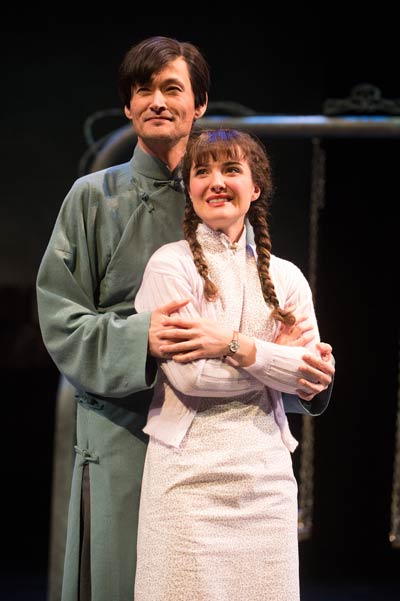
Young lovers Jiang (Cristofer Jean) and Yun (Kate Hurster) in
Secret Love play in OSF’s Secret Love In Peach Blossom Land
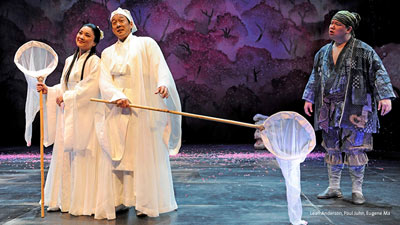
Woman in White (Leah Anderson), Man in White
(Paul Juhn) and Tao (Eugene Ma) in Peach Blossom
Land (utopia) in OSF’s Secret Love In Peach Blossom Land
Although I ordinarily hate to provide spoilers and telegraph endings, because that eliminates suspense for the theater audience, I feel compelled to break that rule for this play. I have spoken to too many theater goers, who after seeing this play, didn’t understand it, and therefore didn’t like it. To make sense of and appreciate this play, you must grasp that there is no happy ending here, because in the real experience of the Chinese population, there was no happy ending. Even after the opening of communication between the two geopolitical divisions, after 40 years, and the possibility of reunions after the long separations, there was mostly just tragic loss, ala Jiang and Yun. What Mr. Lai has so cleverly done is give voice to the profound, shared feelings (i.e., of separation and isolation) of most of the Chinese population springing from the division of China for the majority of the latter half of the 20th Century – and done so in a way that both respects the serious pain of those feelings, and also facilitates a venting of those unpleasant feelings through deeply therapeutic laughter. “Do you take it seriously or not? It’s a different way of looking at the same material and . . . that’s what we’re trying to do in Secret Love In Peach Blossom Land.” [Stan Lai, Director Notes: When Two Plays Collide, https://youtu.be/e9IWBEnt474?list=PLQj1k-BmYkxpJjw0E4F8SjD2sSN4PX_cx&t=342]
The Chinese play came to OSF through a many-years-long dialogue between Mr. Lai and OSF Artistic Director, Bill Rauch, exploring the possibility of such a cross-cultural theatrical presentation here. [Stan Lai, Director Notes: When Two Plays Collide, https://youtu.be/e9IWBEnt474?list=PLQj1k-BmYkxpJjw0E4F8SjD2sSN4PX_cx&t=351] (OSF theatergoers have to love Mr. Rauch for such initiatives in bringing theater treasures from other cultures as well as fresh new plays to the stages here.) The OSF production, which is directed by Mr. Lai, has been adapted by the author for the English language, an American audience, Ashland, and OSF. Secret Love In Peach Blossom Land is set in a theater, and its characters are all theater people, rehearsing the plays within the play. According to Mr. Lai, the many productions in the many different theaters where it has been performed are always adapted to the particular theater where it is being performed. [Stan Lai, Director Notes: When Two Plays Collide, https://youtu.be/e9IWBEnt474?list=PLQj1k-BmYkxpJjw0E4F8SjD2sSN4PX_cx&t=134] That is very well done in adapting the play to OSF’s Bowmer Theatre, to the company’s repertory environment and to the local culture of OSF. So there are frequent references to Ashland and its surroundings (e.g., the local Pear Blossom Festival), to the actors’ roles in other plays in OSF’s repertory this season, to the unavailability of Artistic Director Bill Rauch who can’t be reached to settle the rehearsal scheduling conflict, etc. Some legendary OSF culture is inserted into the production by the device of irritatingly furnishing the Taiwanese author-director of the play-within-a-play, Secret Love, with a typical OSF multi-racial cast for a story that is purely Asian which he thinks requires an all-Asian cast. If one starts with an understanding of the period in Chinese history and culture being represented in the play, and how that affected the Chinese population, it all works very well to provide a very entertaining, interesting, enlightening and thoroughly worthwhile theater experience. “[B]y play’s end, . . . laughter gives way to sobs and the audience is left to contemplate the burdens of memory, history, longing and love — and the power of theater itself.” [The New York Times, Acclaim in China for tried and true ‘Secret Love in Peach Blossom Land’, Sheila Melvin, January 4, 2007].
As usual, OSF does a superlative job with all the theater technical arts which elevate the production to the highest quality theater experience and enhance the show’s performance and the audience’s enjoyment of it. OSF devotes the usual intense, detailed attention to the set, props, costumes, choreography, etc. of the production. The play uses a River Box to facilitate the fisherman’s travel in the Peach Blossom Land play, which is a marvel to behold. [For more info on that, see Snapshot: Secrets of the River Box, https://youtu.be/plQ79btiauw?list=PLQj1k-BmYkxpJjw0E4F8SjD2sSN4PX_cx] It puts to shame the poorer antecedent used for the same function in the Chinese language 1992 film of the play. Similarly well done are the controversial drop utilized for the Peach Blossom Land play (well, I shall not be giving out spoilers on EVERY element of the play – go see it and find out for yourself what that’s about), the prop table used in Peach Blossom Land which is subjected to an excessive amount of abuse to entertaining effect, and a wide variety of props used in the Secret Love play – got to love the street lights. This production also very effectively employs the projection of a variety of images as background for the Secret Love play (which one does not see in the 1992 Chinese film), and which are embraced as another part of the legendary culture of OSF.
Not surprisingly, for as good as all the technical elements of the play may be, the best element of the production is the superlative performances by the actors. There are so many wonderful performances by good actors in this piece, I almost don’t know where to begin. Cristofer Jean gives a well done and memorable performance as the doomed lover Jiang Binliu in the Secret Love play, aging from the besotted, too tall, young lover of 1949 to the infirm, depressed, dying old man 40 years later. I have to add that Mr. Jean was absent from the production for an extended hiatus while battling an illness, and that by all reports from audience members seeing the play in his absence, his presence was sorely missed – his superb performance turns out to be vital to making the play click as it should. Kate Hurster does a fine job of playing his romantic interest, Yun Zhifan – a viewer has no problem at all believing that Jiang is thoroughly entranced with Hurster’s young Yun and remains so over the 40 year timeline of the play. Joseph Anthony Foronda gives a wonderful portrayal as the much put upon author and director of Secret Love. Susana Batres is endearing as Jiang’s nurse and confidant. Vilma Silva presents a thoroughly believable and sympathetic Mrs. Jiang, wife of the Yun-besotted Jiang. Kevin Kenerly as the Assistant Director of Secret Love opens the show with some funny bits and continues to contribute as the show goes on (At one point, to the director’s consternation, the African American Kenerly is announced as the understudy for the lead Asian role of Jiang). And that’s just the actors in the serious play (Secret Love).
Now we come to the hilarious performances of the comical farce, Peach Blossom Land. Eugene Ma is delightful as the cuckolded fisherman, Tao, and nearly steals the show with sidesplitting performances in several scenes (once again, no need for me to spoil the surprise and provide any details – just go see the show!). Leah Anderson is an effective foil for Tao, as his wife Blossom and her doppelganger in utopia, the Woman in White. She has some extremely funny moments of her own in Peach Blossom Land and also playing off her apparent love interest, Master Yuan/the Man in White. Paul Juhn is a cut-up in the role of Master Yuan/the Man in White – his scenes with Ms. Anderson are slapstick-style funny and the facial expressions he adds to the role are so comical they’re almost over the top. Joe Wegner provides an unforgettable turn as Flow, the much put upon stage hand, who has to deal with all kinds of chaos created by the clash of the two plays. Robert Vincent Frank had to learn the tech skills required to fix the defect in the drop as the on-stage Peach Blossom Land scenic painter (he learned well – they may yet hire him for the OSF scenery department). [See Snapshot: Actor Research, https://youtu.be/2IBrso8CYWI?list=PLQj1k-BmYkxpJjw0E4F8SjD2sSN4PX_cx]
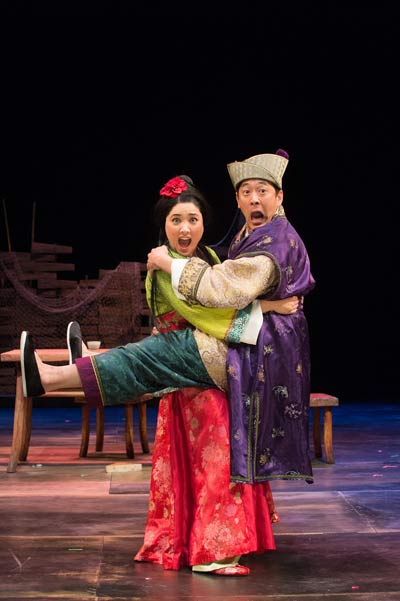
Blossom (Leah Anderson) and Master Yuan (Paul Juhn) in a compromising position in OSF’s Secret Love In Peach Blossom Land
And turning in another fine performance, OSF regular Regan Lynton appears as the “Mysterious Woman” who is not part of the personnel of either of the two plays, but makes repeated appearances on stage interrupting them, searching for a missing, never-seen character, who was supposed to meet her so they could run off together. (I interpret her character as embodying the theme of separation and loss in what I consider to be the “third play,” formed when the two original plays meld together as one). Ms. Lynton, who does all her acting in a wheel chair, does an effective turn with the role. And for those who have wanted to know, yes the character of the “Mysterious Woman” is present in the original play, and does have essentially the same lines, but of course casting Ms. Lynton in the part and having her appear in her wheel chair, adds another bit of OSF culture to the production.
This play is a real Chinese treasure – it’s no coincidence that it has been the most popular contemporary play in China, with a significant piece of history to illuminate, some important ideas and thoughts to draw attention to, and some very deep-seated feelings to draw out. OSF has done an extraordinary job of presenting it on stage – I suspect author/director Stan Lai may have some mixed feelings as a result. He’s got to be happy, just as I am, at how well the play was produced in the Bowmer Theatre by OSF. But just as I feel sad, that many Chinese who have seen, or will see, the play produced elsewhere have not had the opportunity to enjoy the top-notch production values enjoyed by the OSF audiences here, it probably gives Mr. Lai little joy that most of his countrymen don’t get to savor his treasure done with the kind of quality and attention to detail which the work has received here in Ashland. We are very privileged to have that opportunity here and it is unquestionably worth your time, expense and consideration to go see this imported gem (even if it doesn’t have a happy ending!).
Secret Love In Peach Blossom Land will be running in repertory in the theater through October 31, 2015. OSF is also currently running nine additional plays in repertory with Secret Love In Peach Blossom Land: Guys and Dolls, Much Ado About Nothing, and Sweat in the Angus Bowmer Theatre; The Happiest Song Plays Last, Long Day’s Journey Into Night, and Pericles in the Thomas Theatre; and The Count of Monte Cristo, Head Over Heels and Antony and Cleopatra in the Allen Elizabethan Theatre. For tickets, call the OSF box office at 800-219-8161 or order online at http://bit.ly/1yqvboU.
Featured image caption: Jiang (Cristofer Jean), at left, and Yun (Kate Hurster), on swing, acting in a scene from Secret Love while the Director (Joseph Anthony Foronda) makes a point with Mrs. Jiang (Vilma Silva) and Assistant Director Kevin Kenerly looks on in OSF’s Secret Love In Peach Blossom Land. Photo by Jenny Graham.
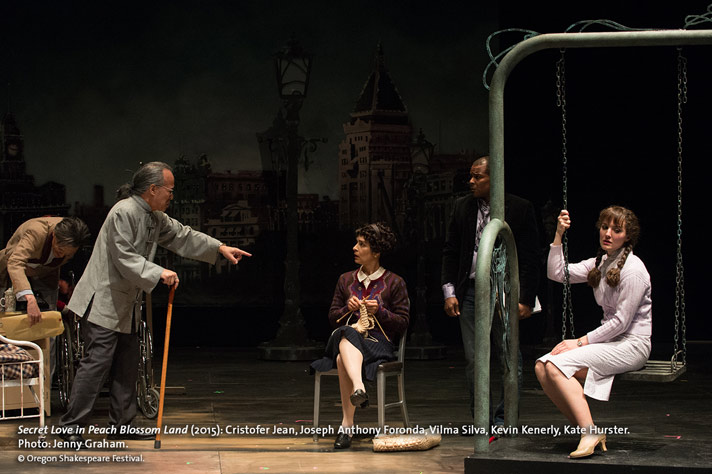
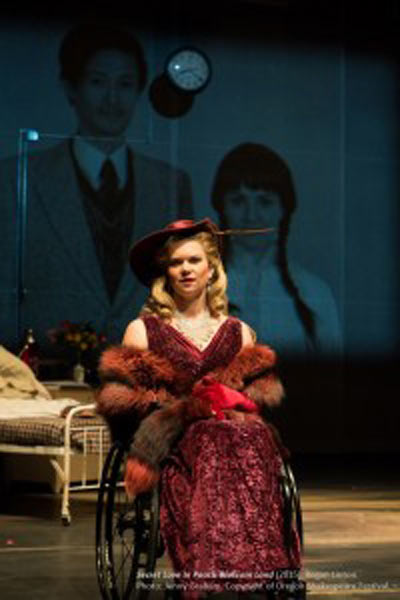
 Lee Greene was born & raised in a NJ family where the only religion worshipped was classical music, Leonard Bernstein was God, and the radio was constantly on and tuned to classical station WQXR (which is now always on in his Jacksonville home thanks to the miracle of the Internet). Growing up in the New York City metropolitan area and later while residing and practicing law in NYC, Lee attended oodles of Broadway and off-Broadway theater productions, as well as concerts and opera at Lincoln Center, Carnegie Hall and other NYC venues. Lee is now a retired attorney, runs a computer support business, and has served on the boards of Rogue Opera & Siskiyou Violins. Lee also writes Performing Arts reviews published on the website,
Lee Greene was born & raised in a NJ family where the only religion worshipped was classical music, Leonard Bernstein was God, and the radio was constantly on and tuned to classical station WQXR (which is now always on in his Jacksonville home thanks to the miracle of the Internet). Growing up in the New York City metropolitan area and later while residing and practicing law in NYC, Lee attended oodles of Broadway and off-Broadway theater productions, as well as concerts and opera at Lincoln Center, Carnegie Hall and other NYC venues. Lee is now a retired attorney, runs a computer support business, and has served on the boards of Rogue Opera & Siskiyou Violins. Lee also writes Performing Arts reviews published on the website,